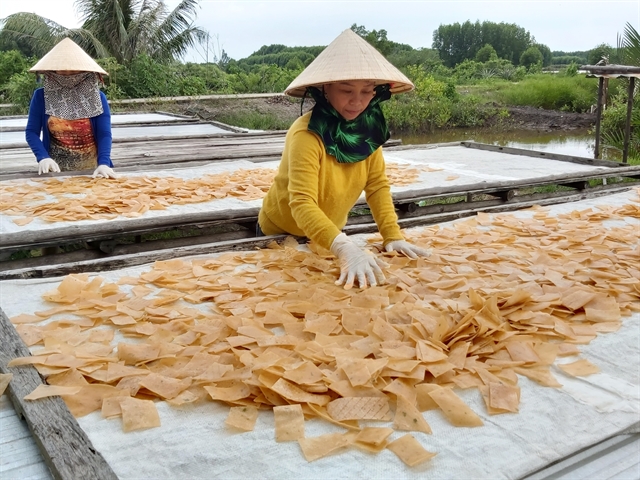 Society
Society

The southernmost province of Cà Mau provides vocational training to its rural population to meet the labour market demand and help provide steady livelihoods.

|
| Drying shrimp crackers in Cà Mau Province’s Ngọc Hiển District. Shrimp crackers are one of Cà Mau’s speciality products. – VNA/VNS Photo Hồng Nhung |
CÀ MAU — The southernmost province of Cà Mau has provided vocational training to its rural population to meet the labour market demand and help provide steady livelihoods.
The province has a population of 1.2 million with 73 per cent of them being of working age, according to its People’s Committee.
Under a 2009 Government Decision on providing vocational training for rural workers until 2020, the People’s Committee identified 75 occupations classified into forestry, agriculture, fisheries, trading, services and construction.
The major occupations include farming bees for honey, growing flowers and ornamental plants, farming shrimp and other aquatic species, and eco-tourism and community-based tourism services.
Từ Hoàng Ân, deputy director of the province's Department of Labour, Invalids and Social Affairs, said the training courses have proven their worth.
More than 327,000 people have received training so far, according to the department.
Of them, 101,400 also received financial support during the training.
Hồ Ngọc Tấn, head of the province’s co-ordinating office for national target programmes, said: “More than 80 per cent of the … trainees have found jobs.”
Their incomes are 50 per cent higher after the training, according to Tấn.
This has helped double the province’s per capita income from 2010 to VNĐ42 million (US$1,800).
The training courses focus on teaching advanced techniques.
In aquaculture courses, for instance, trainees are taught advanced farming techniques, including how to choose quality fry and breed them and methods to harvest and process aquatic species to improve quality.
Before getting the training, most rural people would use traditional breeding methods, resulting in low yields and unsafe produce.
Trần Hồng Quân, deputy chairman of the People’s Committee, said vocational training and creating jobs for rural workers play an important role in achieving socio-economic targets and providing them with steady jobs and incomes.
In Phú Tân District, after getting training in shrimp farming, many people have successfully bred shrimp using the advanced extensive farming model, according to the local vocational training education centre.
The model requires little investment as the farmers only need to buy fry, which eat natural foods, but fetch an income of VNĐ100 million ($4,300) per hectare per year.
But the province faces certain difficulties in providing training, including the low education level of rural people, outdated equipment at vocational training centres and the reluctance of companies to accept trainees as apprentices, according to the department.
The department would only organise vocational courses that are popular among rural people and in demand, Ân said.
It would provide financial support to poor and near poor people and ethnic people who undergo training, he said.
“The province will implement vocational training in combination with programmes to link farmers and companies and agricultural extension models to achieve high efficiency.”
Besides providing training to rural people, the province has also given them support for expanding traditional occupations like making dried shrimp, dried banana, fermented mangrove crabs and chopsticks.
It has also taken measures to promote trade, register brand names for products made in craft villages, transfer advanced production techniques to rural workers and ensure food safety. VNS




